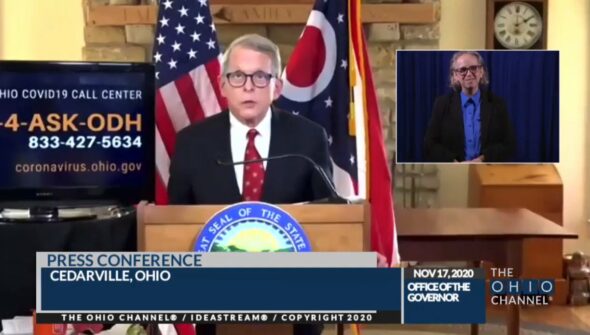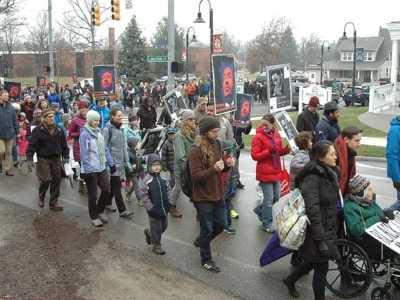
Ohio Gov. Mike DeWine announced a curfew on Nov. 17.
DeWine imposes curfew to slow “dramatic” COVID-19 spread
- Published: November 17, 2020
At a press conference on Tuesday, Nov. 17, Ohio Gov. Mike DeWine announced that the state was imposing a curfew to help curb the “dramatic” spread of COVID-19 in the state.
The curfew will be in effect from 10 p.m. to 5 a.m. daily. It begins on Thursday, Nov. 19, and will continue for three weeks.
“We basically want people not to be out,” DeWine said.
Exceptions to abiding by the curfew include going to work, purchasing groceries or carryout or traveling for medical treatment, DeWine said. Non-essential retail businesses will be closed.
Lt. Gov. Jon Hustead called the curfew a “slowdown, not a shutdown.” Highlighting how fast COVID-19 was spreading in the state, Hustead shared that while it took Ohio five months to reach 100,000 cumulative cases, the state added 100,000 cases in just the last three weeks.
“Doing nothing is not an option,” Hustead of the state’s response to the virus.
DeWine started his COVID-19 briefing by sharing the “good news” that early vaccine trials have been promising. The bad news, though, is that “the situation in Ohio is deteriorating,” he said.
“We are seeing more and more cases, more and more people in the hospital,” DeWine said. “We’ve got to turn this thing around.”
According to DeWine, cases have tripled since mid-October, Currently every county in the state is at least two times the “high incidence” level set by the U.S. Centers for Disease Control. The top 20 counties are seeing “astronomical” spread, he added.
Greene ranked 20th in per capita COVID-19 occurrence, and 1 out of every 143 people in the county tested positive for the virus in the last two weeks, according to state figures.
The number of people hospitalized with COVID-19 is especially worrisome, DeWine said.
On Oct. 13, there were 1,000 Ohioans hospitalized with the virus. That number increased to 2,000 by Nov. 5, hit 3,000 on Nov. 12, and on Nov. 17 had risen to 3,648.
“This is a dramatic, dramatic change,” DeWine said of hospitalization figures.
ICU admissions to treat COVID-19 patients have risen as well. One month ago, 280 Ohioans were in intensive care units. This week, 900 are.
Dr. Bruce Vanderhoff, the chief medical officer at OhioHealth, spoke about the growing crisis in Ohio hospitals. He said that in the spring the focus was conserving personal protective equipment and building excess hospital capacity. Now Ohio’s hospitals are faced with a staffing crisis, as healthcare workers are quarantined or taking time off to care for family members.
“Our caregivers are in a precarious situation,” Vanderhoff said. “Some of them have been treating COVID-19 patients since March, and they are exhausted.”
In response to a question from the news media, DeWine said he was no longer considering closing restaurants, bars and gyms later this week. Instead, he will revisit additional steps when the three-week curfew ends.
By reducing the number of contacts people have with those outside their households and by wearing masks, Ohioans can reduce spread without suffering the ramifications of shutting down some or all businesses and schools.
“If we can all do these things, we will avoid shutdowns,” DeWine said.
Specifically, DeWine said that shutdowns can have “all kinds of unintended consequences,” citing the negative impacts such as job losses, mental health issues, drug overdoses and the stresses on schoolchildren.
DeWine added that when it comes to additional measures, “no one can predict the future,” but that he hoped that Ohioans would take the measures necessary to slow the spread.
“We’re counting on the people of Ohio,” he said. “We’ve got 21 days.”
Read more COVID-19 updates in the Nov. 19 issue of the Yellow Springs News.
The Yellow Springs News encourages respectful discussion of this article.
You must login to post a comment.
Don't have a login? Register for a free YSNews.com account.












No comments yet for this article.